Breaking the Cycle of Mistakes
It has been 80 years since the end of World War II. On September 2, 1945 Europe celebrated an end to extreme nationalism, racism, antisemitism, and authoritarianism. The National Socialist German Worker’s Party, otherwise known as the Nazi Party, was a far-right political party that wreaked havoc from Germany all throughout Europe, killing approximately 6 million Jews as well as 6 million other people including Soviets, Poles, Romanians, Serbs, the disabled, and political opponents.
By the end of the war, Asia was also celebrating. Allied forces’ victory ensured Korea’s freedom from a 35-years long Japanese occupation, giving them once again independence as a nation. Japan’s impact was extensive, having occupied around 20 different countries throughout Asia including both Koreas and parts of China as well as southeast nations such as Laos, Vietnam, the Philippines, and Thailand.
Americans Celebrating the End of World War II
An end to this gruesome six-year long war meant no more death and destruction. It meant freedom from oppression and forced labor, and a halt to mass murders. Finally, nationalism and tyrannical authoritarianism came to an end. Or so we thought.
To ensure that this kind of atrocity would never happen again, peace initiatives through the formation of the United Nations in 1945 and the Paris Peace Treaties of 1947 were designed to prevent similar future global conflicts. The United Nations was to foster international cooperation through maintaining peace and security and promoting cooperation on economic, social, and humanitarian issues.
But history is repeating itself. Worldwide conflicts are on the rise. Nationalism and racism are once again rearing their heads, fostering hate and inflicting harm. From Russia ‘s invasion of Ukraine, to the Israel-Hamas war, and civil wars in various countries such as Sudan and Myanmar, we are seeing a weakening of the United Nations’ influence and a rise in authoritative governments.
Koreans Celebrating Independence from Japan
Why are we not learning from history and where is this new wave of conflicts coming from? Simply put, it is pride. Arrogance. Unrelenting greed and selfishness.
We all desire to be great. Every nation should be proud of who they are and where they come from. We should support our country and be proud to be citizens. Economic prosperity. International dominance. National pride. These slogans stir up the hearts of many.
However, in extreme pride, we never fully see the value of other people. This kind of pride comes before the fall for every nation and culture. It was true for both Germany and Japan in World War II, and it will continue to prove true today. From the Babylonian Empire to Nazi Germany, pride ultimately causes collapse.
Why is this? Pride does not give credit where credit is deserved. It judges instead of comforts and corrects or blames instead of loves. Pride demands. It does not invite.
Not all pride is bad. Healthy pride is good. Parents being proud of their children or teachers being proud of their students is a good thing. It is normal for one to be proud of one’s own country, as well. A healthy sense of pride does not see oneself greater than others but rather relishes the value of each individual and how each nation contributes to the world.
But pride that is overly zealous for one’s own nation and peoples to the exclusion of others becomes arrogant, haughty, and demeaning. It squashes and tramples on others. It cultivates an us versus them mentality that eventually leads to hate.
Today we may be on the brink of another world war. As we have become more polarized now than ever, the world is in crisis. More than ever, it is critical to say no to pride. No more abuses of power. No more oppression. No more violence and death.
We must respond to pride by doing the opposite and humbling ourselves. We need to open up our hearts and minds to try to understand those from opposing views. We must choose peace over destruction. Even if we don’t get our own way, choosing each other instead of widening the gap of division.
My husband and I experienced this first-hand in North Korea. For over seventy years, North Korea has operated under a totalitarian communist regime. It took a huge leap of faith for us to travel there. You might think that we were out of our minds to have moved there. Maybe we were. But what we found was that North Korea is perhaps one of the most misunderstood nations in the world. It is dark, but once we experienced the reality of living in that nation, we discovered that it was nothing like what we had expected. A curtain was pulled back to a world we did not know existed, and our lives were forever changed.
The two of us in Pyongyang, North Korea
Taking a huge risk to identify with those opposite from us is radical. The more we interact with people different from ourselves, the more we ourselves are changed, and with this brings hope. When we humble ourselves and put ourselves in the other’s shoes, we allow ourselves to be vulnerable. We acknowledge our own struggles and fears, and despite this brokenness, our transparent authenticity has the capability of bringing us closer together instead of apart.
We need courage and the strength today to resist repeating the world’s greatest mistakes. Ultimately, may we learn how to transition out from a polarized world and learn how to connect with one another. This is the journey of love. The darkness of pride may surround us, but the one thing that penetrates the depths of this chasm is love. May we cross the divide with love.


